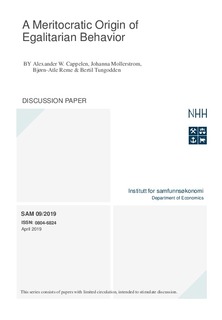| dc.contributor.author | Cappelen, Alexander W. | |
| dc.contributor.author | Mollestrom, Johanna | |
| dc.contributor.author | Reme, Bjørn-Atle | |
| dc.contributor.author | Tungodden, Bertil | |
| dc.date.accessioned | 2019-05-02T09:16:00Z | |
| dc.date.available | 2019-05-02T09:16:00Z | |
| dc.date.issued | 2019-04-29 | |
| dc.identifier.issn | 0804-6824 | |
| dc.identifier.uri | http://hdl.handle.net/11250/2596268 | |
| dc.description.abstract | The meritocratic fairness ideal implies that inequalities in earnings are regarded as fair only when they reflect differences in performance. Consequently, implementation of the meritocratic fairness ideal requires complete information about individual performances, but in practice, such information is often not available. We study redistributive behavior in the common, but previously understudied, situation where there is uncertainty about whether inequality is reflecting performance or luck. We show theoretically that meritocrats in such situations can become very egalitarian in their behavior, and that the degree to which this happens depends on how they trade off the probability of making mistakes and the size of mistakes that they risk making when redistributing under uncertainty. Our laboratory experiments show, in line with our model, that uncertainty about the source of inequality provides a strong egalitarian pull on the behavior of meritocrats. In addition, the external validity of our framework, and the results from the laboratory, are supported in two general population surveys conducted in the United States and Norway. | nb_NO |
| dc.language.iso | eng | nb_NO |
| dc.publisher | Institutt for samfunnsøkonomi | nb_NO |
| dc.relation.ispartofseries | DP SAM;09/2019 | |
| dc.subject | inequality, fairness, redistribution, responsibility, performance, luck, experiment, survey | nb_NO |
| dc.title | A Meritocratic Origin of Egalitarian Behavior | nb_NO |
| dc.type | Working paper | nb_NO |
| dc.subject.nsi | Samfunnsvitenskap | nb_NO |
| dc.source.pagenumber | 62 | nb_NO |
| dc.relation.project | 262675 | nb_NO |
